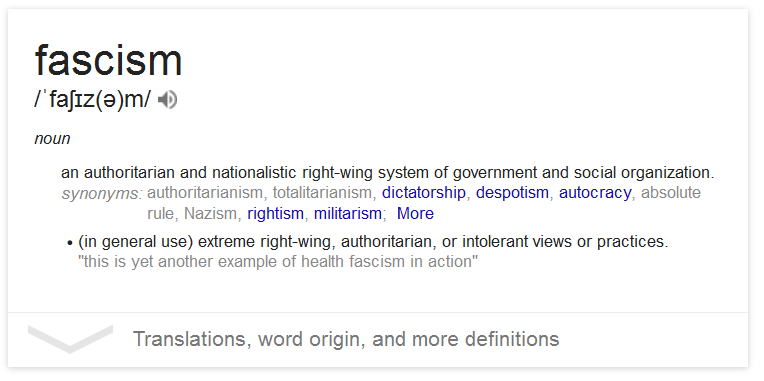It looks like you're using an Ad Blocker.
Please white-list or disable AboveTopSecret.com in your ad-blocking tool.
Thank you.
Some features of ATS will be disabled while you continue to use an ad-blocker.
share:
originally posted by: GamleGamle
a reply to: introvert
Thanks for that. Its all good.
Kind Regards.
Perhaps you misunderstand. I am truly interested in learning where I may be wrong.
I'm highly-informed on the issue, but can accept that I do not know everything.
If you have something to add, please do.
originally posted by: ErrorErrorError
So we have right wingers of ATS whining over people comparing Trump to Hitler yet the same right wingers love to demonize the left by comparing them with fascists
Got it
I think you summarized and condensed what I've been trying to say for a while now. Apparently everyone is evil except the conservatives?
It's a mad world...isn't it?
a reply to: introvert
Oh sorry I got my fascist dictators mixed up.
newrepublic.com...
Oh sorry I got my fascist dictators mixed up.
Roosevelt’s original proposal for what would become the National Firearms Act of 1934, the first federal gun control law, sought to tax all firearms and establish a national registry of guns.
newrepublic.com...
originally posted by: ColCurious
a reply to: introvert
I'm Conservative myself by the way... for German standards that is.
And this is important for some Americans to understand:
Political "Wings" are RELATIVE!
Whats more is that the political spectrum is not two dimensional ... as in left and right wing.
Along with the conservative vs liberal (small l and c) axis there is also an axis that runs between totalitarianism and anarchy. The political parties and movements through out the world and history lie along both axes.
The reason there is so much debate about wethere Fascism is a left or right wing ideology is because it is nether. It's what you get the farther you move up the political spectrum toward totalitarianism... and you can move up to this point from anywhere along the left right spectrum.
edit
on 17-12-2015 by ButsDuge because: (no reason given)
I found a pretty neat website that has an interactive presentation on political/economic spectrum's.
Here's from one of the last, after you combine economic and political spectrum's together:

So you see, dictators exist on BOTH ends of the spectrum...Fascism, however, appears on the right/conservative side of the spectrum.
This is what I keep saying. If GOP Republicans want to call Democratic candidates or politicians dictators, they need to go after the actual and appropriate kind.
Communism is one end, fascism is on the other.
Website
Here's from one of the last, after you combine economic and political spectrum's together:

So you see, dictators exist on BOTH ends of the spectrum...Fascism, however, appears on the right/conservative side of the spectrum.
This is what I keep saying. If GOP Republicans want to call Democratic candidates or politicians dictators, they need to go after the actual and appropriate kind.
Communism is one end, fascism is on the other.
Website
edit on 17-12-2015 by MystikMushroom because: (no reason given)
a reply to: introvert
That is exactly what I am saying. Sincerely. I see that you are more informed than I am on the subject overall. So I have seen nothing to correct you in. I was just being self conscious about my lack of concrete knowledge and projecting my personal feelings of inadequacy onto your praise. If that makes sense. My bad. Carry on. As I said all good.
That is exactly what I am saying. Sincerely. I see that you are more informed than I am on the subject overall. So I have seen nothing to correct you in. I was just being self conscious about my lack of concrete knowledge and projecting my personal feelings of inadequacy onto your praise. If that makes sense. My bad. Carry on. As I said all good.
a reply to: ElectricUniverse
Well, the right-wingnutters and the socialist = two cheeks of the same ar*se. But, then again:


Well, the right-wingnutters and the socialist = two cheeks of the same ar*se. But, then again:


edit on 18-12-2015 by mekhanics because: (no reason given)
a reply to: MystikMushroom
Great failure.
The Communist governments all use(d) "dictatorial capitalism" (as defined by Left Wing sources)
China, USSR, Cuba etc. etc.
And of course, "Democratic Socialism" (EU) depends 100% on "Capitalism".
Great failure.
The Communist governments all use(d) "dictatorial capitalism" (as defined by Left Wing sources)
China, USSR, Cuba etc. etc.
And of course, "Democratic Socialism" (EU) depends 100% on "Capitalism".
originally posted by: introvert
The first problem when approaching this particular issue is that there is a language barrier. Certain terms and phrases may appear to say one thing when viewed through our modern understanding of them. But they were used in different ways and meant something a bit different back then.
One example would be the word socialism.
People see the word socialism in the name of the Nazi party, National Socialist German Workers' Party, and assume that the word "socialist" is used with the same meaning as we believe today. But it's more complicated than that. It would be better if you understood how it was applied by those that lived back then.
The Nazi ideology was based on "Volksgemeinschaft". It means a community of people. A unified nation. A union. That is the context in which the term "socialist" is used. It's more applicable to ultra-nationalism than it is to actual socialism. You have to remember that socialism is an economic and political model. Very little of which was incorporated by the Nazis.
Anyway, you have to better understand the differences in terminology between the 1930's and 2015 to better understand Nazis, fascism and socialism.
K, that's great Intro, but that still leaves me questioning why 2015 socialists have adopted some 1930's socialist solutions.
originally posted by: dukeofjive696969
a reply to: neo96
Quoting goebels does not change the fact that fascisms is a right wing doctrine.
Proof?
Or are you just a JiveTurkey..
a reply to: Wardaddy454
Of course there is going to be a bit of overlap from then till now, but what 1930's solutions have been adopted by modern socialists?
Be specific.
K, that's great Intro, but that still leaves me questioning why 2015 socialists have adopted some 1930's socialist solutions.
Of course there is going to be a bit of overlap from then till now, but what 1930's solutions have been adopted by modern socialists?
Be specific.
edit on 18-12-2015 by introvert because: (no reason given)
originally posted by: BuzzyWigs
a reply to: ElectricUniverse
I am not entirely certain you understand socialism.
Hmmm.
I am actually quite certain that you don't understand socialism.....Democratic Socialism.
And that you have no intention of doing so......
and that no matter what information is provided.....you refuse to do so.....
Such a shame to belabor lies.
Meh. These threads pop up every so often where a bunch of people on the right try to accuse Socialists of being fascists just because the word "Socialist" shows up in the Nazi name. Then they seek out all sorts of information to confirm their foregone conclusion that Nazi = Socialist. They aren't seeking to learn, only to shout their opinions and insult everyone who disagrees.
a reply to: Eilasvaleleyn
I'm cool with that
:-)
The label's stupid, might as well just call it "Bernieism."
I'm cool with that
:-)
originally posted by: introvert
The first problem when approaching this particular issue is that there is a language barrier. Certain terms and phrases may appear to say one thing when viewed through our modern understanding of them. But they were used in different ways and meant something a bit different back then.
One example would be the word socialism.
People see the word socialism in the name of the Nazi party, National Socialist German Workers' Party, and assume that the word "socialist" is used with the same meaning as we believe today. But it's more complicated than that. It would be better if you understood how it was applied by those that lived back then.
The Nazi ideology was based on "Volksgemeinschaft". It means a community of people. A unified nation. A union. That is the context in which the term "socialist" is used. It's more applicable to ultra-nationalism than it is to actual socialism. You have to remember that socialism is an economic and political model. Very little of which was incorporated by the Nazis.
Anyway, you have to better understand the differences in terminology between the 1930's and 2015 to better understand Nazis, fascism and socialism.
1000 stars for you!!
Definitions of words are extremely important in this topic. It falls on deaf ears, however, because folks so badly want to make liberals the next Nazi regime - it is emotionally satisfying for them to do so.
And misinterpreting history, misunderstanding it, is one of the best ways to make sure you don't learn from it.
peace,
AB
a reply to: neo96
This Red Scare stuff is just so tiring - and simple minded
Fascism doesn't belong to any one kind of thinking - fascism isn't political. It's more basic than that. More human. It can call itself whatever it wants - and work it's way into any system
We should all be afraid of fascism. Very afraid
Neo! In a weird way - I kinda sorta agree with you :-)
But seriously - past a certain point you and your commie under every bed buddies are no longer contributing to a rational conversation
Whatever will you do if Bernie wins?
:-)
This Red Scare stuff is just so tiring - and simple minded
Fascism doesn't belong to any one kind of thinking - fascism isn't political. It's more basic than that. More human. It can call itself whatever it wants - and work it's way into any system
We should all be afraid of fascism. Very afraid
Neo! In a weird way - I kinda sorta agree with you :-)
But seriously - past a certain point you and your commie under every bed buddies are no longer contributing to a rational conversation
Whatever will you do if Bernie wins?
:-)
edit on 12/18/2015 by Spiramirabilis because: tiny little things...
Fascism is the marriage of the state and large corporate interests, with strong nationalist and collectivist ideology.
The most fascist program probably in US history is Obamacare. It is very technically fascist, as the government mandates purchase of corporate products behind the power of the state for the "good of the nation". Fascist.
The most fascist program probably in US history is Obamacare. It is very technically fascist, as the government mandates purchase of corporate products behind the power of the state for the "good of the nation". Fascist.
a reply to: pirhanna
How about my taxes going to fund wars that should never have happened so that military contractors and the likes of Halliburton can all have an extra cushy future?
RIght
Fascism is the marriage of the state and large corporate interests, with strong nationalist and collectivist ideology.
How about my taxes going to fund wars that should never have happened so that military contractors and the likes of Halliburton can all have an extra cushy future?
RIght
new topics
-
Democrats send letter to Biden urging him to ratify Equal Rights Amendment
US Political Madness: 4 hours ago
top topics
-
Reprehensible Behavior
US Political Madness: 15 hours ago, 11 flags -
This is adorable you guys!
General Chit Chat: 15 hours ago, 9 flags -
Defending the need for adherence to Old Testament commandments under the new covenant of Christ
Conspiracies in Religions: 16 hours ago, 5 flags -
Democrats send letter to Biden urging him to ratify Equal Rights Amendment
US Political Madness: 4 hours ago, 2 flags
active topics
-
Only two Navy destroyers currently operational as fleet size hits record low
Military Projects • 24 • : Freeborn -
Defending the need for adherence to Old Testament commandments under the new covenant of Christ
Conspiracies in Religions • 27 • : FlyersFan -
Those Fake Death Numbers From Hamas Out Of Gaza
Middle East Issues • 193 • : FlyersFan -
Rant. I am sick of people saying the police are revenue raising.
Rant • 13 • : PorkChop96 -
Light from Space Might Be Travelling Instantaneously
Space Exploration • 28 • : Lazy88 -
More Bad News for Labour and Rachel Reeves Stole Christmas from Working Families
Regional Politics • 9 • : covent -
Democrats send letter to Biden urging him to ratify Equal Rights Amendment
US Political Madness • 2 • : VariedcodeSole -
Post A Funny (T&C Friendly) Pic Part IV: The LOL awakens!
General Chit Chat • 7914 • : Cymru -
George Stephanopoulos and ABC agree to pay $15 million to settle Trump defamation suit
Mainstream News • 25 • : Echo007 -
-@TH3WH17ERABB17- -Q- ---TIME TO SHOW THE WORLD--- -Part- --44--
Dissecting Disinformation • 3713 • : 777Vader

